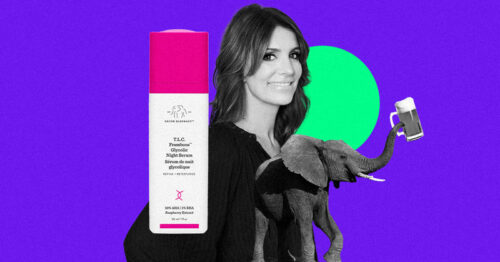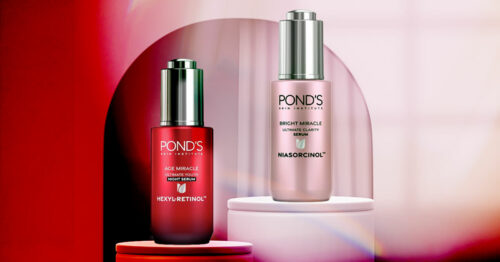Morphe’s rep has suffered through the years given their slate of problematic ambassadors. Did we really not expect this?
At the height of YouTube, everyone flocked to the video-sharing platform to learn how to do their makeup. “Baking” had a different meaning, plus everything was matte and full coverage. The “Instagram aesthetic” dominated our feeds, which translated to, for one: defined, polished-looking brows. We all wanted to get our hands on Kylie’s lip kits. And beauty gurus can cause a product to sell out in mere seconds.
Long before the reign of short-form video app TikTok, one brand stood out among the rest: Morphe. As “a beauty brand created for the creators,” you couldn’t go through your favorite beauty guru’s latest video without hearing a Morphe discount code that pushed you to cop their multi-use palettes and ride-or-die brushes. Having collaborated with controversial names like Jaclyn Hill, Jeffree Star and James Charles, they’ve proven that even bad marketing is still marketing—well, to an extent.
RELATED: Where Are Our Favorite Vine Stars Now?
On the first week of January, Morphe surprised everyone by announcing that they’ll be closing their stores in the U.S., leaving thousands of employees unemployed. In a Twitter statement, the beauty retailer shares, “We have made the difficult decision to close all Morphe stores in the U.S. We are forever grateful to our store teams for their passion, talent and dedication over the years.”
We have made the difficult decision to close all Morphe stores in the U.S. We are forever grateful to our store teams for their passion, talent and dedication over the years.
— Morphe (@MorpheBrushes) January 5, 2023
#JusticeForMorpheRetailEmployees started trending on TikTok, as former employees posted videos of being let go—all with less than a week's notice and no explanation. One user shares that he’s only receiving a “heartbreaking” three weeks of severance pay, even though he's stayed with the company for five years.
@theeblingking I cant believe it 😢 #morphe #justiceformorpheretailemployees #justiceformorpheemployees #bankrupt #bankruptcy #makeup #makeupfyp ♬ She Share Story (for Vlog) – 山口夕依
A week after Morphe announced the closure of their brick-and-mortar stores in America, their parent company Forma—responsible for brands like r.e.m beauty and Jaclyn Cosmetics—filed for Chapter 11 bankruptcy. According to a statement, Forma will have its assets acquired by investors, and it will be receiving US$33 million in financing from the group.
@allure So what does this mean for other lines like #rembeauty, #jaclynhillcosmetics and other lines in the company's portfolio? Click the #linkinbio to learn more. #morphe #morphestoreclosing #beautynews #greenscreen ♬ original sound – Allure
On Instagram, user @trendstopia comments, “When deceptive choices towards your customer base, constant shilling by the influencers, stale launches and working with 2 of the most problematic influencers (you know their names) finally catches up with you 🤷♀️.”
Meanwhile, user @gabbehgabbehgabbeh gives her POV, “Shows that developing a loyal fanbase with cult classics and great formula will persevere over frequent collaborations with influencers.”
RELATED: From Gemini Hair to Grunge Glam, Here Are Beauty Trends Reigning in 2023
In a three-part video commentary entitled The End of A $2 Billion Brand, FARSÁLI founder Sal Ali (who departed from Sephora in 2020) shares his own thoughts about Morphe’s closure. “When Morphe was acquired in 2019, the investors didn't understand the power of the influencers during that era…Influencers could make or break a brand. And when a brand's awareness is heavily dependent on influencers…they practically have a chokehold on your brand,” he reveals.
Ali then compares the whole debacle to Becca Cosmetics' iconic collaboration with Jaclyn Hill—the popular Champagne Pop collection—that put the brand on the map overnight, which the owners eventually sold to Estée Lauder for US$200 million. In September of 2021, Becca, unfortunately, closed down.
The FARSÁLI founder adds: “As a brand, you make a conscious decision of which influencers represent you…If your brand is out there working with vocal, polarizing influencers, you take on the risk and the reward that comes with it.”
RELATED: Celebrity Beauty Moments & Trends from 2022 We’re Taking to 2023
The beauty industry—and with it, its consumers—has changed, especially during the pandemic where we found ourselves stripping down to the essentials. We’re no longer filling our vanities with beauty products that will remain untouched, just because our favorite beauty guru told us to get them. With many re-evaluating their spending habits amid a global inflation, consumers are smarter and much more frugal.
Morphe definitely made a mark on the beauty industry. I, for one, still have two of their bestselling eyeshadow palettes in my arsenal—expired, sure, but I still haven’t had the heart to dispose of them. They championed beauty enthusiasts and professionals—whether you were a struggling makeup artist or a beauty influencer with a following.
Times have indeed changed. And while we’re still getting our latest budol from our favorite content creators showing up on our TikTok feeds, we’ve become more discerning about the brands we align with. At the end of the day, we want to spend our hard-earned money wisely and honestly.
Art Matthew Ian Fetalver


















